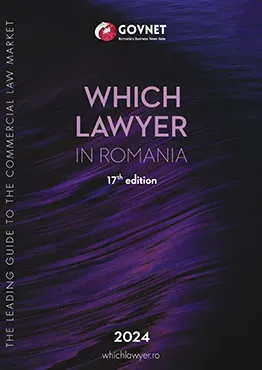- About Us
-
Expertise
- Banking & Finance
- Capital Markets
- Competition & Antitrust
- Corporate & Commercial
- Data Privacy
- Employment & Pensions
- Energy & Natural Resources
- Gambling & Betting
- Healthcare & Pharmaceuticals
- Insurance
- Intellectual Property
- International Arbitration
- Litigation
- Mergers & Acquisitions
- Project Finance/PPP, Concessions & Infrastructure
- Public Procurement
- Real Estate
- Restructuring & Insolvency
- Sports Law
- Tax
- Telecommunications, Media & Technology
- Transports & Logistics
- White Collar Compliance & Defense
- Our team
- Careers
- Publications
- News and Press
- Contact
Articles
Which Lawyer in Romania 17th edition
PPP
New barriers to access public
procurement in the EU?
DEVELOPMENTS & TRENDS

Diana Dobra, Senior Associate
What to expect next?
The Decision of the ECJ in the CRRC Qingdao Sifang case (C-266/22)
The ECJ is expected to rule on the interpretation of art. 25 of the Directive 2014/24/EU, this time in a request from the Bucharest Court of Appeal in relation to the participation of a Chinese operator to a tender organized by a railway authority. While the context seems different from the Kolin case, as the question refers mainly to the application in time of the EGO no. 25/2021, it will still be interesting to see the position of the Court.
Contracting entities to pay more attention to the provisions of art. 235 [Conditions relating to the GPA and other international agreements] under Directive 2014/24/EU following Kolin Decision
While the Kolin Decision does not interpret the Utilities Directive as encompassing a prohibition to participate in EU public procurement tenders, it clearly stressed that the obligation to accord to the third-country operators no less favorable than the treatment accorded to the economic operators of the Union is strictly applied to those economic operators, works, supplies and services that are covered by Annexes 3, 4 and 5 and the General Notes to the European Union's Appendix I to the GPA and by the other international agreements by which the Union is bound. As the GPA contains also some caveats and exclusions of certain types of services coming from its signatories, it is expected for national authorities to pay more attention to the terms of the GPA and to apply different treatment to economic operators coming from the same country depending on the scope of the contract.
More investigations and complaints under the FSR & Investigations under the IPI
Besides the already known cases of in-depth investigations under the FSR followed by notifications submitted by bidders in public procurement procedures that were closed to date in all cases as a result of the withdrawal of their bids, a [new] trend appears to be shaping due to the reporting system embedded in the FSR. As any legal or natural person may report to the Commission any information relating to foreign subsidies distorting the internal market under the FSR, it seems that this 'whistleblowing' instrument is used by competitors to ask the Commission to investigate financial contributions received by other party/ies.
Also, with the aim to remove discrimination in public procurement, the Commission is expected to launch new investigations under the IPI, especially where there are barriers to EU companies due to unfair differentiation between local and foreign companies or between locally produced and imported products. To date, the Commission has initiated its first investigation under the IPI in response to measures and practices in the Chinese procurement market for medical devices which are unfairly discriminating against European companies and products.
An evaluation of the Public Procurement Directives
As requested by the European Court of Auditors (ECA) and the Council, the European Commission is set to carry out an in-depth evaluation of the existing legislative framework on public procurement. This measure was announced in the Political guidelines for the next term 2024-2029 and appears to be currently in preparation, with public consultation planned for the fourth quarter of 2024 and Commission adoption planned for the third quarter of 2025. The aim is to assess whether the rules are working as intended and whether a revision is necessary during the 2024-2029 term.
The results of such exercise and most importantly the measures that will be taken, including around third-country bidders' access to public procurement procedures will most likely be prompted by the shifts in the political landscape of many European countries and in the European Parliament and on the foreseeable policy change following the election of a new administration in the United States of America.
Continue reading
COMPETITION
Foreign Direct Investment Screening in Romania:
An evolving and challenging
legal landscape

Mihaela Ion, Partner
Take-aways and further developments
For the time being, given the broad scope of sectors subject of the FDI screening, limited transparency regarding specific screening criteria, and generally extensive interpretation approach, many non-critical M&A transactions may fall within the scope of FDI regulations.
In this context and given the severity of financial sanctions, investors have shown increased caution and under the principle of "better safe than sorry" decided to notify also investments that normally do not fall under the FDI scrutiny. However, this approach serves as a critical test for the CEISD, which should operate as a selective filter, issuing decisions only for investments that fall within the scope of FDI in accordance with legal provisions, while disregarding generalized approaches.

Vanessa Nistor, Senior Associate
The new FDI regime is still in its infancy - the legal landscape will remain dynamic in the foreseeable future. Over time, current ambiguities and potential hurdles are expected to be resolved, aiming to ensure a more stable and predictable investment environment.
At the same time, looking ahead, a relaxation of the screening mechanism is not expected. According to public information from CEISD, the list of sensitive sectors will remain unchanged.
This approach aligns with broader EU trends that are continually reshaping FDI screening to be both more expansive and more stringent.
Continue reading
Download Article











